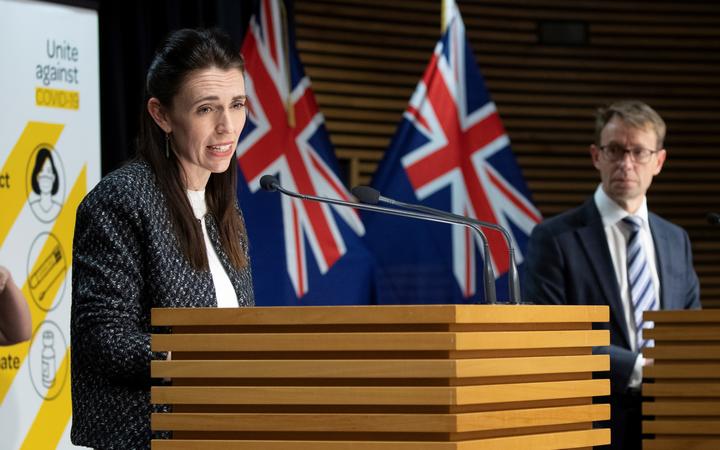From midnight tomorrow, Tāmaki Makaurau will remain in alert level 3 but Aucklanders will have some restrictions eased.
 Photo: POOL / NZME
Photo: POOL / NZME
The prime minister has set out a three-stage roadmap to easing restrictions and has outlined what will change from 11.59pm tomorrow.
The Director-General of Health says restrictions will ease in the region over four to eight weeks.
“I’m sure like everybody, particularly in Auckland, we’re looking forward to a summer where we can enjoy freedoms and our ticket to that is vaccination, so the next four to eight weeks into early December is critical to get our vaccination rates up.”
Cabinet has agreed the rest of New Zealand will remain at alert level 2 – with the only change being the 100 person limit in hospitality venues removed.
Prime Minister Jacinda Ardern says right at the beginning the government described Delta as a game-changer, “and it has proven to be so. It has been more infectious and more persistent … what we have called a long tail feels more like a tentacle that has been incredibly hard to shake”.
Cabinet has been asking, she says, how to make things a bit easier, and together with the public health team has designed the road map.
“The science tells us Covid finds it hard to spread outdoors … children can have a play date in a park, friends can meet outside for a walk, a picnic or a beer.”
She says the ‘outdoor’ part may not sound relevant but it is in fact the most relevant part of all. “Keep it outside”.
Watch today’s alert level announcement :
Ardern says the public health team believe that with the right precautions in place, the risk posed by reopening ECE is low. This includes limits of 10 within a bubble in ECE and strict infection control.
“To ensure this is done as safely as possible though, we’re encouraging early learning teachers to get tested alongside other Aucklanders who will return to work and we’ll look at options for more regular but less invasive surveillance testing going forward. This is an added precaution and an acknowledgement that children at that age cannot be vaccinated.”
Ardern says the public health advice is that these changes are unlikely to contribute to uncontrolled growth in the outbreak. They are believed to also make a material difference to Aucklanders’ lives.
‘Vaccines mean that in the future we can do things differently’
Ongoing increases to Auckland’s vaccination rates will be part of the government’s decision to progress the three phases of this roadmap when Cabinet assesses it each week.
This transition does not include a return to large-scale events in Auckland. Ardern says a more vaccinated population and vaccine certificates is the best pathway back to that, and the government is in conversation with the relevant sectors about how this could work. The government will go over its plans for this scheme next week.
Ardern says restrictions have prevented what could have otherwise been exponential growth in the virus over many weeks.
She says the restrictions were the right choice, and the only choice at the time because of the vaccination levels – 42 percent of Aucklanders had one dose of the vaccine and 25 percent of Aucklanders were fully vaccinated.
In the seven weeks since, those numbers have risen to 84 percent and 52 percent, she says.
“Modelling is also now telling us that while we’re still seeing cases, it’s now 50 percent less than what we could’ve seen without vaccinations.”
She says the vaccinations mean in future we will not need so many restrictions, but “we’re not there yet”.
For this outbreak, it’s clear that long periods of heavy restrictions has not got us to zero cases, Ardern says, “but that is okay. Elimination was important because we didn’t have vaccines, now we do”.
She says we need to keep using the tools we have, including vaccination, testing, tracing, isolation, and controlling any outbreak now and into the future.
“This is a change in approach we were always going to make over time, but the Delta outbreak has accelerated that transition. Vaccines, will support it,” she says.
Ardern says she knows continued alert level restrictions are frustrating, particularly in the South Island where no cases have been seen for some time, but it is important to remember that it is the restrictions which has meant the virus has not spread further.
“Vaccines mean that in the future we can do things differently … but that does mean that we need you to be vaccinated. I have heard some people who are willing to be vaccinated say they are waiting just a little bit longer before they make that choice.
“They may not be worried about the immediate side effects but they want to see long-term health effects. I want to give you the assurance you need that the vaccine is safe … I encourage you to have that conversation with your health professional.”
“This is not an Auckland problem, but rather a solution that only the team of 5 million can deliver on and we need everyone to play their part.”
vaccinated to be frequently tested. We’ll work our way through those we will talk to the sector about the practical realities of all of those other things.”
